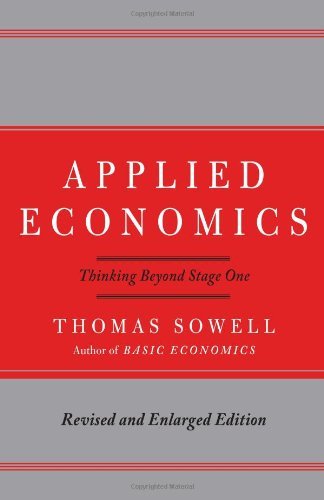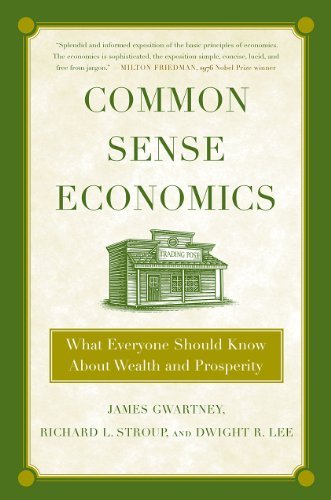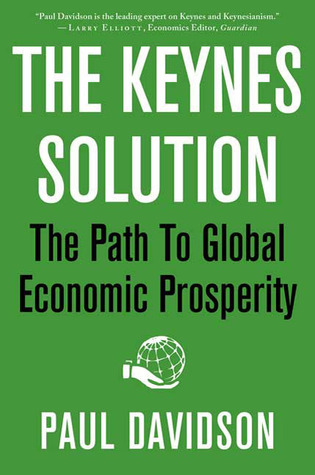
Applied Economics: Thinking Beyond Stage One
Book Description
What if the choices we make today ripple through time, altering destinies beyond our imagination? In "Applied Economics: Thinking Beyond Stage One," Thomas Sowell unravels the intricate web of human decisions that shape economies and societies. With compelling clarity, he explores how policies and incentives have far-reaching consequences that often escape notice. By tracing the unintended effects of seemingly simple actions, Sowell reveals how the real world operates beneath the surface of academic theory. As complexities unfold and assumptions are challenged, one question looms large: are we truly prepared to confront the hidden costs of our choices?
Quick Book Summary
"Applied Economics: Thinking Beyond Stage One" by Thomas Sowell offers readers a critical framework for evaluating economic policies beyond their immediate effects. Sowell contends that decision-makers often focus on short-term benefits, neglecting to consider the complex, unintended consequences that follow. Using real-world examples from labor markets, housing, education, and healthcare, he demonstrates how superficially appealing solutions can backfire. Sowell emphasizes the importance of incentives, trade-offs, and the dispersal of knowledge in shaping outcomes. By encouraging readers to "think beyond stage one," Sowell equips them with the tools to critically analyze policies and recognize the hidden costs that may emerge over time. The book is a call for rigorous thinking and skepticism toward simplistic policy fixes.
Summary of Key Ideas
Table of Contents
Thinking Beyond Immediate Consequences
Sowell opens his analysis by challenging the tendency among policymakers, media, and the public to consider only the immediate, visible consequences of economic decisions—a phenomenon he calls "thinking at stage one." Policies are often evaluated based on their direct impact, such as creating jobs or reducing prices, rather than their cumulative effects through time. Sowell argues that this short-sightedness leads to flawed conclusions and costly mistakes, as the secondary and tertiary effects of interventions are frequently ignored or misunderstood.
The Role of Incentives and Trade-Offs
A key focus of Sowell's framework is the central role that incentives and trade-offs play in shaping economic behavior. He illustrates how both individuals and institutions respond to changes in costs and benefits, regardless of policymakers’ intentions. By highlighting real-life examples in labor markets and price controls, he demonstrates that well-meaning interventions—such as minimum wage laws or efforts to cap rents—can unintentionally harm the very groups they aim to help by distorting incentives, reducing opportunities, and creating shortages.
Unintended Consequences of Policy
A recurring theme in Sowell's analysis is the pervasiveness of unintended consequences. He explains how complex systems react in unpredictable ways to government interventions. For example, policies that attempt to make housing more affordable by instituting rent controls often lead to housing shortages or declines in quality. Similarly, attempts to artificially prop up certain sectors or protect specific jobs may stifle innovation, drive up costs, or disadvantage other segments of the population, underlining the need for caution and humility in policymaking.
Dispersed Knowledge and Decentralized Decision-Making
Sowell draws attention to the limitations of central planning and the importance of dispersed knowledge. He asserts that no single individual or central authority can possess enough information to make fully informed decisions for diverse populations. Decentralized decision-making—where individuals respond to localized knowledge and incentives—leads to more efficient and adaptable economic outcomes. Market signals, such as prices, convey critical information that helps allocate resources effectively, in ways that central planners cannot replicate.
Evaluating Popular Policy Solutions
In his critical examination of popular policy solutions, Sowell encourages skepticism toward proposals that promise quick fixes or painless cures. He urges readers to look past rhetoric and superficial logic to consider the broader, longer-term effects of proposed economic interventions. Ultimately, Sowell provides not just a critique of bad policy but also equips readers with a mindset for rigorous evaluation: always think beyond stage one, take account of incentives, and respect the complexity of economic systems.
Download This Summary
Get a free PDF of this summary instantly — no email required.





